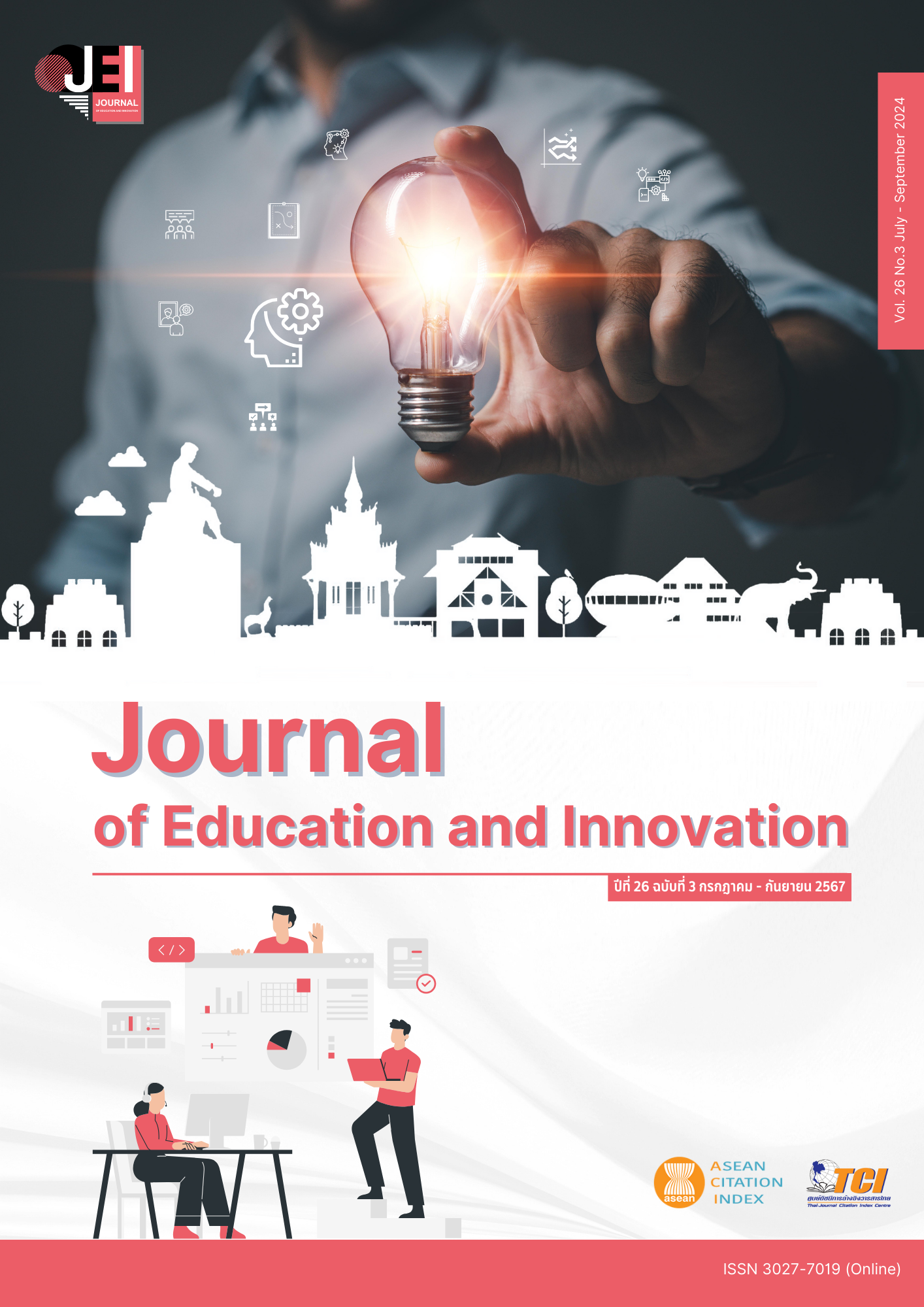LEARNING IMPLEMENTATION BASED ON OPEN APPROACH TO DEVELOP STUDENT TEACHERS’ COMPETENCIES IN INTEGRATING TECHNOLOGY TO MATHEMATICAL LEARNING IMPLEMENTATION
Main Article Content
Abstract
This research aimed to develop competencies in integrating technology to implementing student teachers’ mathematical learning and to study students’ satisfaction with the learning implement using open approach. Participants in this research were 47 student teachers. Research instruments consisted of lesson plans, assessment of competencies of integrating technology in implement learning adapted from UNESCO’s (2010) competency framework, an observation form, and questionnaires. Data were analyzed through content analysis from student teachers’ work and the descriptive statistics including Percent, Average and S.D. The results were as follows; 1) The competency in integrating technology in learning implement of student teachers has improved from Cycle 1, where competency was at levels 1-2, to Cycle 4 of action research, where students' competency was at levels 2-4. There were 36 students with competencies from level 3 and above, accounting for 76.60 percent. That is, student teachers have the ability to design and create Mathematics task that are appropriate to the mathematical content. Along with specifying the appropriated way of using the pieces created from The Geometer's Sketchpad to be used in the teaching process to help with learning and emphasize the participation of students. 2) The overall satisfaction level of open approach was at the very satisfied level ( = 4.68, SD = 0.60).
Article Details

This work is licensed under a Creative Commons Attribution-NonCommercial-NoDerivatives 4.0 International License.
The owner of the article does not copy or violate any of its copyright. If any copyright infringement occurs or prosecution, in any case, the Editorial Board is not involved in all the rights to the owner of the article to be performed.
References
Hicks, D., Lee, J., Berson, M., Bolick, C., & Diem, R. (2014). Guidelines for using technology to prepare social studies teachers. Contemporary Issues in Technology and Teacher Education, 14(4), 433-450.
Inprasitha, M. (2014). Processes of Problem Solving in School Mathematics. Khon Kaen: Pen Printing Company.
Inprasitha, M. (2017). Lesson Study and Open Approach: 15 years of mathematics teaching innovation in Thailand. Khon Kaen: Institute for Research and Development in Teaching Profession for ASEAN, Khon Kaen Uniersity.
Inprasitha, M. (2018). Curriculum for the development of teachers and educational personnel in teaching in 2018. Khon Kaen: Institute for Research and Development in Teaching Profession for ASEAN, Khon Kaen University.
Inprasitha, M. (2022). Processes of Problem Solving in School Mathematics (2nd ed.). Khon Kaen: I-Print Design Company.
Isoda, M., & Nakamura, T. (2010). The Theory of Problem Solving Approach. In Isoda, M. & Nakamura, T. (Ed.). Journal of Japan Society of Mathematical Education (p.1). Japan: Bunshoudo Insatusho.
Koehler, M. J., & Mishra, P. (2009). What is technological pedagogical content knowledge? Contemporary Issues in Technology and Teacher Education, 9(1), 60-70.
Makaramani, R. (2013). Thai teachers and ICT. The Teachers Council of Thailand Conference 2013 on Research to Increase Educational Quality and Professional Development. Bangkok: The Teachers Council of Thailand.
Ministry of Education. (2018). Policy of the Office of the Basic Education Commission 2018. Retrieved August 1, 2019, from https://www.obec.go.th/archives/5476
Ministry of Education. (2019). Bachelor’s degree qualification standards Department of Education and Department of Education (4-year program) 2019. Retrieved August 2, 2020, from https://www.ratchakitcha.soc.go.th/DATA/PDF/2562/E/056/T_0012.PDF
Nelson, D. (2013). Action Research: An Appropriate Research Paradigm for Practitioners. Language in India, 13(10), p.183-196.
Niess, M. L., Ronau, R. N., Shafer, K. G., Driskell, S. O., Harper S. R., Johnston, C., Browning, C., Özgün-Koca, S. A., & Kersaint, G. (2009). Mathematics teacher TPACK standards and development model. Contemporary Issues in Technology and Teacher Education, 9(1), 4-24.
Office of the Economic and Social Development Board. (2018). National strategy 2018-2037. Bangkok: Office of the Economic and Social Development Board.
Office of the Education Council. (2019). New generation Thai teachers are interested in digital. Bangkok: Prikwarn Graphic.
Office of the National Economic and Social Development Council. (2022). National Economic and Social Development Plan No. 13 (2023-2027). Thai government gazette.
Ritthichan, S. (2019). Thai Teachers in Education Era 4.0 for Sustainable Academic Development. In P. Alai (Ed.), Research to create innovations for local development and Thai society towards a Disruptive Society. The 11th NPRU national academic conference. (p.1620-1627). Research and Development institute Nakhon Pathom Rajabhat University.
Sarnsuwan, W., & Yamsang, N. (2020). The effect of open approach on mathematics learning achievement and mathematical problem solving ability of grade 5 students. Online Journal for Graduate Study Faculty of Education Ramkhamhaeng University, 2020, 1-17.
Siphai, S., & Sinlarat, P. (2018). Thailand's Educational Transformation towards Education 4.0. Journal of Educational Measurement Mahasarakham University, 24(2), 13-27.
Srinon, R., Srinon, U., Yomdit, V., & Kitnopkiat, K. (2018). Active Learning Management in the Era of Thailand 4.0. Journal of Educational Administration Silpakorn University, 9(2), 331-343.
Suwanroj, T., Leekejwattana, P., Saeung, O., & Siripan, A. (2020). The Essential digital competency for undergraduate students in Thai higher education institutions: Academic documents analysis. Narkbhutparitat journal Nakhon Si Thammarat Rajabhat University, 12(2), 88-106.
Thammaprateep, J. (2019). Using ICT in the science classroom: The role of teachers is important for success in using ICT. Retrieved August 1, 2020, from https://docs.wixstatic.com/ugd/73fa4a_6d55cfd5d4bb46bd9fc85b1be4fc0189.pdf
UNESCO. (2010). ICT Transforming Education: A Regional Guide. Bangkok: UNESCO.
Vikaraman, S. S., Mansor, A. N., & Hamzah, M. I. M. (2017). Mentoring and coaching practices for beginner teachers—A need for mentor coaching skills training and principal’s support. Creative Education, 8(1), 156-169.
Wongyai, W., & Patphol, M. (2019). Developing the quality of learning management according to the professional learning community. Bangkok: Innovative Leaders Center of Curriculum and Learning.
Wongyai, W., & Patphol, M. (2021). Digital Competency. Bangkok: Innovative Leaders Center of Curriculum and Learning.


